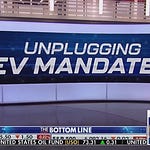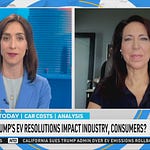Car Dealerships BEG the US Government to Help Them Sell Electric Cars
By Lauren Fix, The Car Coach®
When auto dealers start writing impassioned letters to Congress demanding to keep electric vehicle (EV) tax credits alive, it’s a clear sign the honeymoon phase of EV policy is over. Behind the public messaging of “going green” and “building the future,” a growing number of dealers and manufacturers are panicking - not because consumer demand is soaring - but because it’s not. The incentives are doing more than promoting environmental goals; they’re propping up an industry shift that never had strong grassroots support in the first place.
Now, with the federal government poised to scale back or eliminate EV tax credits, some in the automotive industry are scrambling. CarMax, Carvana, and several dealer groups are urging Congress to preserve the subsidies that have underwritten their investments in EV sales and service. Their plea is simple: without the $7,500 incentive on new EVs and $4,000 on used models, sales will slump. One Seattle-area dealer even warned of a 25–30% drop in EV sales.
But let’s be honest - this isn’t about saving the environment anymore. It’s about protecting profit margins and preserving political capital after years of lobbying silence. These same companies and their lobbying arms didn’t push back when mandates were being written into law. Now that the tide is turning, they want taxpayers to continue footing the bill for what is, at its core, a luxury purchase for high-income households with easy access to charging infrastructure. For most American this is out of their price range and charging infrastructure isn’t available.
What’s Changing in Washington?
Congressional Republicans, backed by growing public skepticism of EV mandates, are trying to remove the taxpayer-funded cushion that has made EVs appear more affordable than they actually are. The Senate version of the “Big Beautiful Bill” proposes ending EV tax credits by September 30, 2025 - three months earlier than the House version. The credits were initially set to expire in 2032.
Here’s what’s at stake:
New EVs (under $80,000): Up to $7,500 in tax credits.
Used EVs (under $25,000): Up to $4,000 in tax credits.
Automakers under the 200,000-EV threshold: Can still qualify for incentives under current law until 2026.
But under Section 112002 of the Senate bill, those tax credits are on the chopping block. And the same bill would add a $250 annual registration fee for EVs and a $100 fee for hybrids and plug-in hybrids to compensate for lost gas tax revenue used to maintain highways - an acknowledgment that EV drivers currently don’t pay their share for public roads and the roads are in horrible shape across the U.S.
Too Little, Too Late?
Dealers and manufacturers had years to challenge the growing federal mandates that funneled billions into EV production and infrastructure. They didn’t. Why? Because the gravy train was still running. Billions in government contracts, purchase incentives, and sweetheart regulatory deals made it too lucrative to speak out. Now, with the Trump administration signaling a sharp reversal of course, the industry wants the benefits to stay - even if the rules are changing.
Sorry, but this is the cost of doing business. You don’t get to opt out of pushback now that the political winds have shifted. If customers want EVs, they’ll buy them.
That’s how the free market works. What we’re seeing now is an attempt to artificially prop up demand with taxpayer dollars, even as surveys show most Americans still prefer internal combustion or hybrid vehicles, citing price, range anxiety, and lack of infrastructure as major concerns.
A Judicial Speed Bump in the EV Rollback
In a twist that highlights the tangled relationship between politics and policy, a federal judge has temporarily blocked the Trump administration from halting EV infrastructure funds for 14 states. These funds, stemming from President Biden’s Infrastructure Investment and Jobs Act, were designed to eliminate “range anxiety” by building a nationwide EV charging network. The result was $5 billion spent and 7 EV chargers are live today. A massive waste of your tax dollars.
U.S. District Judge Tana Lin ruled that withholding these funds exceeded federal authority. As a result, states like California, New York, and Colorado will see their EV charging infrastructure plans reinstated for now, but the appeal is underway and most likely these funds will be clawed back.
Still, this judicial intervention doesn’t fundamentally shift the larger momentum. Trump’s Department of Transportation has made it clear: the Biden-Buttigieg New Electric Vehicle Initiative program was a failure, and it’s being removed. The outcome of this legal battle could delay the administration’s intent to unwind EV mandates and funding boondoggles. But in the end the EV mandate and incentives will disappear.
USPS EVs and the Ford-Oshkosh Saga
Even the U.S. Postal Service is caught in the EV policy crossfire. Ford and Oshkosh Defense, suppliers of the agency’s Next Generation Delivery Vehicles (NGDVs), were supposed to be all electric. The postal service will sell-off of thousands of EVs and charging stations are shut down under the new legislation. But the Senate parliamentarian recently ruled that such a move would require a 60-vote supermajority, effectively shelving it. Senators are rewriting the amendment as the parliamentarian has become politically charged to alter the bill.
Why does this matter? Because it shows just how embedded (and expensive) this EV experiment has become. Forcing the USPS to go 100% electric is a waste of tax dollars and causes problems and delays of mail deliveries. Scrapping its EV fleet would cost even more taxpayers dollars, the manufacturers were having trouble producing the electric vehicles, meeting the promised timelines and the agreed upon price. Multiply that across federal, state, and municipal levels, and the taxpayer burden becomes staggering. This is a waste of your tax dollars that could be used for so many other needed services and repairs.
Who Actually Benefits from EV Incentives?
Let’s not sugarcoat this. EV incentives overwhelmingly benefit upper-middle-class and wealthy Americans. They’re the ones who can afford $60,000 Teslas or $80,000 Hummer EVs. They can afford home chargers, have multiple cars and easy access to public charging. The very Americans who are footing the bill for these incentives - the working class - are the least likely to benefit from them.
Moreover, EVs are not as “clean” as their marketing and main stream media suggests. The mining of lithium, cobalt, and rare earth metals comes with serious environmental and human consequences, often in countries with little regulation. And the electricity that powers these vehicles? Still largely generated from coal and natural gas in many parts of the U.S.
The Bottom Line: Let the Market Decide
The EV market hasn’t succeed like the past administration claimed. There’s still minimal demand, drivers want lower-cost gas vehicles, hybrids, and plug-in hybrids. But the idea that EVs are the inevitable future and must be subsidized into dominance is not grounded in economic or consumer reality. Buy one if you want an EV there is some great product available.
Manufacturers and dealers made a business bet. Some will win, others will lose. But the solution isn’t to keep squeezing taxpayers. It’s to give consumers choices - gas, hybrid, diesel, or electric - and let the best technology win in a fair and open marketplace.
Instead of begging Congress to keep the incentives, maybe the industry should take a hard look at how it got here. Consumers want freedom of choice, not government mandates wrapped in green marketing. If EVs are truly better, they’ll succeed on their own merits.
You can support me by buying me a cup of coffee. Thanks for subscribing and your support! https://www.buymeacoffee.com/laurenfix
Looking for more automotive news?
https://www.CarCoachReports.com
Total Car Score Podcast ► https://www.revolverpodcasts.com/shows/total-car-score/
Lauren Fix is an automotive expert and journalist covering industry trends, policy changes, and their impact on drivers nationwide. Follow her on X @LaurenFix for the latest car news and insights.















Share this post